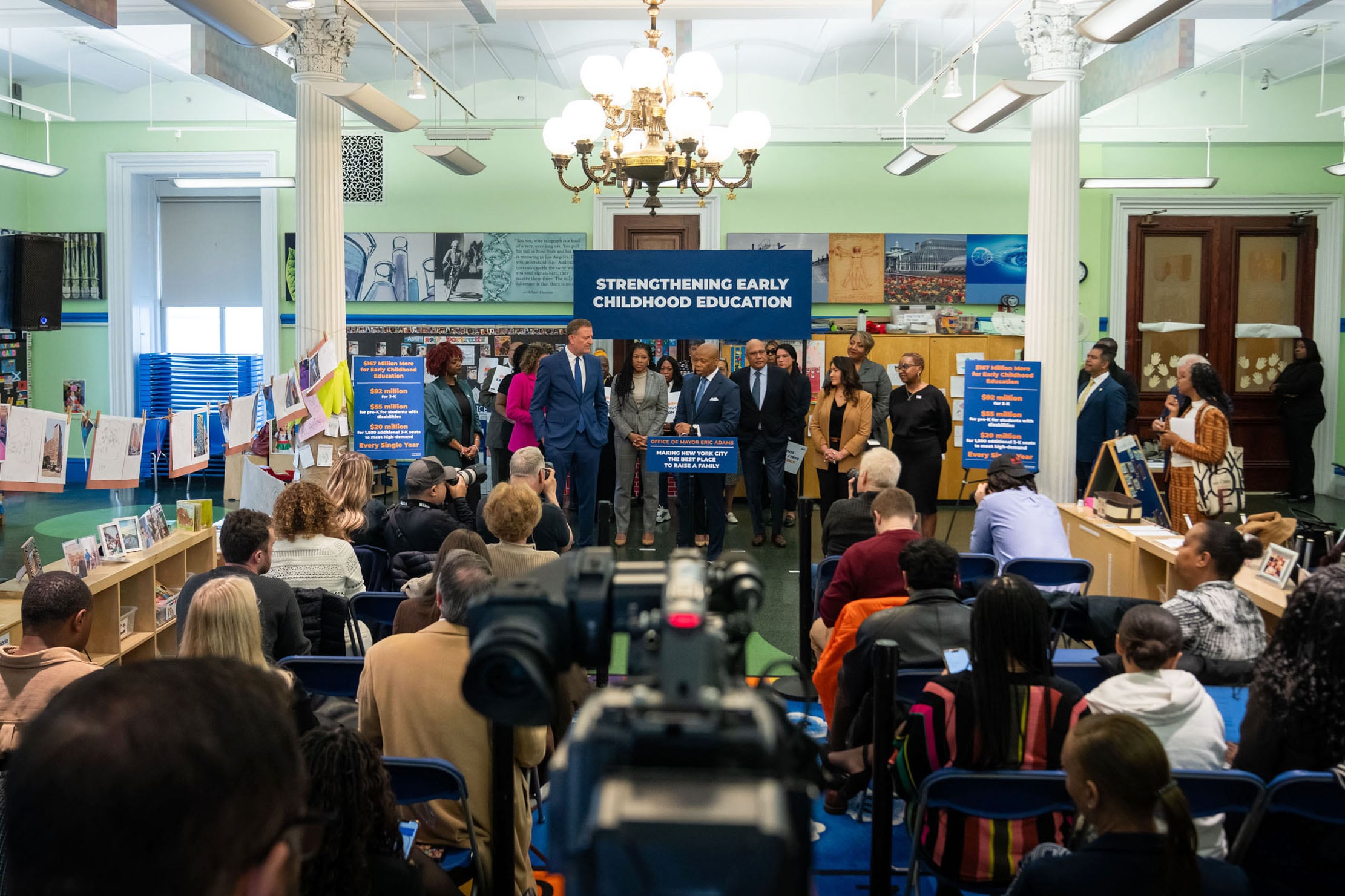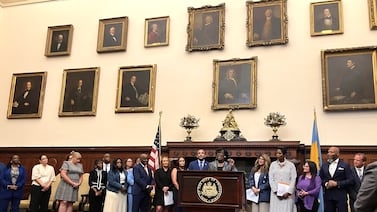Sign up for Chalkbeat New York’s free daily newsletter to get essential news about NYC’s public schools delivered to your inbox.
After threatening to allow nearly $200 million in early childhood spending to expire, Mayor Eric Adams announced plans Wednesday to keep most of it in the budget for next year and beyond.
The move will restore $112 million for 3-K, the city’s free preschool program for 3-year-olds, and $55 million to help address a chronic shortage of seats for preschool children with disabilities.
Education Department officials also committed to temporarily using city money to sustain some federally funded Head Start programs amid the Trump administration’s efforts to slash the program.
In a press conference Wednesday alongside his predecessor Bill de Blasio, who launched the city’s free universal preschool program, Adams touted the restoration as a historic investment in the early childhood education system.
“This is a Herculean task that we are able to accomplish,” Adams said.
Adams, who faces an uphill battle for reelection this year, promised to make the funding a permanent part of the budget.
The announcement was welcome news for many early childhood education providers who have been deeply concerned about budget threats at both the state and federal level next year.
“Against the backdrop of simultaneous challenges facing early childhood education programs and providers in NYC, including significant funding shortfalls in the State’s child care assistance program and looming threats to Head Start funding at the Federal level, today’s announcement provides much-needed relief,” said Tara Gardner, the executive director of the Daycare Council, which represents dozens of childcare providers.
The move to restore the early childhood funding now instead of at the last minute after negotiations with City Council, as Adams did last year, could also ease political pressure on the mayor.
But leaders of the City Council, none of whom were present at Wednesday’s announcement, were not so quick to praise Adams, noting that he did not restore all of the expiring funding and that he could have avoided the cuts in the first place.
“Taking funding away from children’s programs that our families rely on and only putting some of it back doesn’t make you a champion; it only harms the early childhood education system,” said Council speaker Adrienne Adams, education chair Rita Joseph, and finance chair Justin Brannan in a joint statement.
Mayor Adams said he left the funding out of his preliminary budget in January because of “economic uncertainties.”
Speaker Adams, who is running for mayor, has also called on Mayor Adams to renew funding in his executive budget for a $25 million program that offers families seats with extended hours and $84 million to expand access to child care vouchers. That budget is expected by the end of the month.
A new chapter in yearslong battle to sustain 3-K funding
Wednesday’s announcement is the latest chapter in a battle over early childhood education that has been simmering since Adams took office in 2022, when the system was still reeling from pandemic-driven enrollment declines but flush with federal COVID aid.
De Blasio had used hundreds of millions of dollars of that aid to aggressively expand 3-K in an effort to make it universal, like he’d previously done for prekindergarten. But the Adams administration backed off that promise — swamped by more immediate problems including thousands of vacant seats in some neighborhoods and a severe payment delay crisis that forced some programs to shutter.
Adams officials at the time were not shy about laying the blame for those problems at the feet of the de Blasio administration, with former schools Chancellor David Banks saying “there have been a lot of messes to try to clean up.” Critics countered that many of the problems were self-inflicted and the result of poor leadership that led to a mass exodus in the Education Department’s early childhood division.
De Blasio and Adams put any animosity aside on Wednesday.
“One can have differences on applications, implementations, but we don’t differ on the foundation,” said Adams. “We are joined at the hip, and now we are building on what he started.”
As the federal COVID aid that funded the 3-K expansion expired, funding for early childhood education became a major point of contention with the City Council.
The commitment to make the 3-K and special education funding permanent could ease that battle and create more stability for providers, but challenges with the system remain.
Last year, 3-K enrollment was roughly 44,000, with more than 8,000 unfilled seats, according to city data. Pre-K enrollment was around 59,000 last year — down from a peak of over 70,000 before the pandemic — with 14,000 unfilled seats. Even with all those vacant seats, thousands of students didn’t initially get an offer to one of their preferred 3-K programs last year.
Adams said the city has more work to do in better aligning seats with demand, but said the process of closing seats in areas without high enough demand can be “painful … we have to be sensitive on how do we address that without traumatizing families and children.”
Council members fought last year to get an additional $5 million to improve the city’s outreach efforts to help fill vacant seats, but that money so far has not been restored for next year’s budget.
Students with disabilities face chronic shortage
The city’s promise of universal preschool has for years failed to reach students with disabilities, who have faced a chronic shortage of seats.
Adams vowed to address the problem by boosting funding to help community organizations make their wages more competitive and adding $55 million to open new seats.
Advocates praised the restoration of that $55 million, but it will likely still not be enough to guarantee a spot for every student who has a legal right to one.
About 651 preschool students with disabilities were waiting for placements this spring, Christina Foti, the city’s top special education official, said during a March City Council hearing.
Plus, advocates contend even more aggressive investments are needed to provide those students with a full range of services. More than 7,900 preschool students had not yet received at least one mandated service, such as speech or physical therapy. Nearly 4,600 of them — or 58% — had yet to receive any special education services listed on their learning plan, Foti said at the March hearing.
To address those gaps, advocates have called for $70 million more to beef up evaluations and services — funding that Adams has not yet committed.
Some Head Start providers get some relief, but fears loom large
Officials also promised Wednesday to use city money to help stabilize some Head Start providers facing deep uncertainty because of the Trump administration’s efforts to slash the program.
Head Start, which began in 1965 as part of President Lyndon Johnson’s war on poverty, funds early childhood programs for roughly 20,000 kids from low-income families across the city, according to federal data.
Providers who offer the program can either contract directly with the federal government, or subcontract from the city Education Department, which holds a Head Start grant for about 6,000 seats.
The program is facing several looming threats in the five boroughs. The grant held by the city Education Department ends in June, and the city was forced to re-compete for its contract because past concerns about its performance led to an audit. The city has not yet heard back on the results of that application, but officials have said they’re expecting big changes — ranging from receiving less money than before, to a change in the age distribution of seats, to losing the grant altogether — creating uncertainty for providers and families.
On top of that, U.S. Health and Human Services Robert F. Kennedy Jr. abruptly closed five of the 10 regional Head Start offices across the country, including New York’s, in late March, leaving providers in the dark about who is reviewing the city’s grant applications and when — or if — they’ll hear back.
“There’s a question of … are they reviewing these applications at all?” said Bridget O’Rourke, the associate executive director of early childhood education at University Settlement.
In the longer term, Project 2025, the conservative blueprint that has guided Trump’s early policy efforts, calls for the elimination of Head Start, claiming it’s “fraught with scandal and abuse” and has little positive impact, despite extensive research showing the opposite. And Trump is proposing to end Head Start’s funding in his initial budget proposal, USA Today reported last week, though a final budget must be approved by Congress.
To help allay some of those concerns, Education Department officials met with providers who subcontract from the city on Tuesday and assured them that if the federal government slashes the city’s grant, the city will use its own money to keep those programs going next year, according to a provider on the call.
City officials didn’t immediately say how much money they’d set aside for that scenario. And while the city’s commitment gives some assurance to providers who subcontract from the Education Department, it doesn’t extend to programs that contract directly from the federal government, according to people familiar with the plans.
Those programs, which serve thousands of city students, are still reeling from the closure of the New York regional office, and many are waiting to hear back on their own grant applications.
“Right now … direct service has not been impacted,” said Rita Santelia, the chief executive officer of Mosholu Montefiore Community Center, which enrolls 400 students across Head Start and Early Head Start programs. “But we as providers are on tenterhooks… we’re not sure when the shoe is going to drop. You can’t operate with this level of fear.”
Michael Elsen-Rooney is a reporter for Chalkbeat New York, covering NYC public schools. Contact Michael at melsen-rooney@chalkbeat.org
Alex Zimmerman is a reporter for Chalkbeat New York, covering NYC public schools. Contact Alex at azimmerman@chalkbeat.org.







